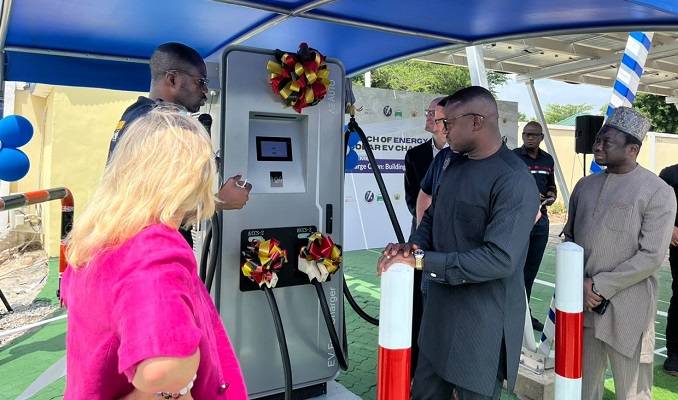Ghana has taken a major leap in green infrastructure with the launch of its first solar-powered electric vehicle (EV) charging station. Developed through a collaboration between the Energy Commission and the German Agency for International Cooperation (GIZ), this groundbreaking station sits at the Commission’s headquarters in Accra and delivers 60 kilowatts of clean charging power, entirely from the sun.
The station harnesses energy through 105 solar panels, producing 61.43kWp, and stores it in a 60kWh lithium-ion battery. According to GBC Ghana, this system makes it possible to charge EVs sustainably, even during power outages or peak demand periods. The impact is impressive—up to 90% lower environmental emissions compared to traditional grid-powered alternatives.
A vision supported by leaders
At the launch event, Ghana’s Minister for Energy and Green Transition, Mr. John Abdulai Jinapor, underscored the broader vision: “We are taking it a step further—where you will use solar to charge your vehicle—and for me, that is very important.” He noted that the Ministry has submitted a proposal recommending that Members of Parliament adopt EVs, signalling the government’s strong commitment to lead by example. As cited by Ghana News Agency
The Acting Executive Secretary of the Energy Commission, Mrs. Eunice Biritwum, spoke about the national implications of the project. She said the station not only promotes environmental sustainability but also advances energy independence by using Ghana’s vast solar resources, contributing meaningfully to the country’s net-zero goals.
What this means for Ghana?
The solar EV station is more than just a technical milestone—it represents a turning point in Ghana’s development path. By replacing fossil fuel dependence with solar energy, it promotes cleaner urban mobility and helps reduce carbon emissions in line with Sustainable Development Goals 7 and 13.
According to Ghanaian Times, the project will also reduce the need for imported fuel, saving foreign exchange and enhancing national energy security. For consumers, the long-term promise is cheaper, cleaner, and more accessible transportation powered by the sun.
Ghana’s clean mobility initiative is guided by a larger national strategy. According to the Ministry of Energy and Green Transition, the government aims to deploy 100 fast-charging stations in the next five years, many of them solar-powered. A phased EV policy targets 35% of new vehicle sales to be electric by 2035, with the hope of a complete transition by 2045.
Building a greener tomorrow
This charging station is also envisioned as a hub for learning and experimentation. Dr. Dirk Abmann, GIZ Country Director, stated that the facility is “a foundation, not a finish line.” It will provide a space for researchers and engineers to refine EV technology adapted to local needs and climate conditions.
While countries like Kenya and Nigeria are advancing in EV deployment—with Kenya focusing on electric public buses and Nigeria trialing battery swap stations—Ghana stands out for integrating solar-powered charging solutions. As The Business & Financial Times notes, this positions Ghana as a leader in renewable-powered transport infrastructure across West Africa.
Everyday impact
For everyday Ghanaians, these changes could lead to cleaner air in urban centers, reduced transport costs in the long term, and new business opportunities. As solar power cuts reliance on fuel imports, the country will also benefit from improved energy resilience and reduced vulnerability to global oil price shocks.
As Ghana prepares for more EV rollouts in urban centers and highways, this pilot station could serve as a blueprint for other nations in West Africa. It blends innovation with vision—illuminating a future where clean energy drives both progress and prosperity.




